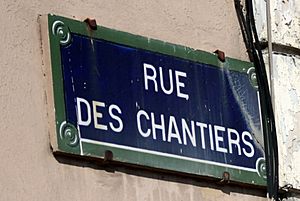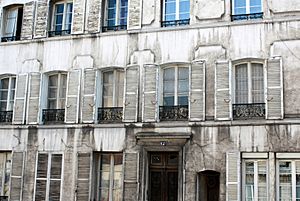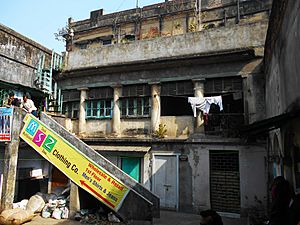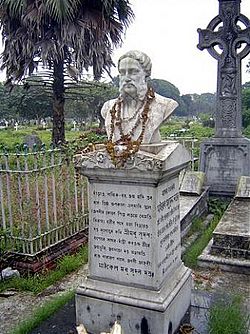Michael Madhusudan Dutt facts for kids
Quick facts for kids
Michael Madhusudan Dutt
|
|
|---|---|
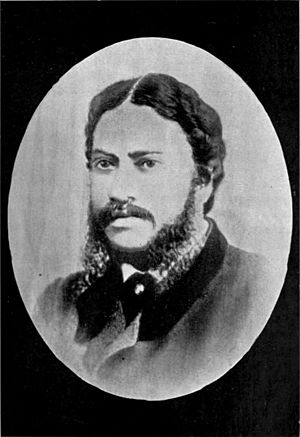
Portrait of Michael Madhusudan Dutt, c. 1907
|
|
| Native name |
মাইকেল মধুসূদন দত্ত
|
| Born | Sri Madhusudan Dutta 25 January 1824 Sagardari, Jessore District, Bengal Presidency, Company Raj Present day Jessore District, Bangladesh |
| Died | 29 June 1873 (aged 49) Calcutta, Bengal Presidency, British Raj |
| Resting place | Lower Circular Road cemetery |
| Occupation | Writer, poet, playwright |
| Citizenship | British Indian |
| Alma mater | Hindu College Gray's Inn |
| Literary movement | Bengal Renaissance |
| Spouse | Rebecca Thompson McTavish (m. 1848–1856) |
| Partner | Emilia Henrietta Sophie White (1858–1873) |
| Children | 4 |
Michael Madhusudan Dutt (Bengali: মাইকেল মধুসূদন দত্ত; 25 January 1824 – 29 June 1873) was a famous Bengali poet and playwright. Many people see him as one of the first people to create modern Bengali literature.
Contents
Early Life and Education
Michael Madhusudan Dutt was born in a village called Sagardari. This village is in the Jessore District of Bengal Presidency, which was part of British India. His family was Hindu and had enough money to give him a good education.
He learned English at home and also went to school. His father, Rajnarayan, wanted him to get a Western education. He hoped this would help Michael get a good job in the government.
College and Becoming a Christian
When Michael was about fifteen, he finished his schooling in Sagardari. His father then sent him to Calcutta to study at Hindu College. The goal was for him to become a barrister, which is a type of lawyer.
At Hindu College, Michael studied a Western-style curriculum. The college was set up to help "uplift the natives" by teaching them European ways. Students had to wear Western clothes and eat European food using forks and knives. They also learned British songs and spoke only English. The idea was to create a group of educated Indians who could work for the British government.
During his time at Hindu College, Michael became very interested in European culture. He wanted to be accepted into it. He even wrote a poem about this feeling:
"Where man in all his truest glory lives,
And nature's face is exquisitely sweet;
For those fair climes I heave impatient sigh,
There let me live and there let me die".
One of his teachers, David Lester Richardson, greatly influenced him. Richardson was a poet and taught Michael to love English poetry, especially the works of Byron. Michael started writing English poems when he was about 17. He sent his poems to magazines in England, but they were never published. During this time, he also wrote many letters to his friend, Gour Das Bysack. These letters tell us a lot about his life.
On 9 February 1843, Michael decided to become a Christian at the Old Mission Church. His parents and relatives did not agree with this choice. He only started using the name Michael when he got married in 1848. He wrote a poem about becoming a Christian:
Long sunk in superstition's night,
By Sin and Satan driven,
I saw not, cared not for the light
That leads the blind to Heaven.
But now, at length thy grace, O Lord!
Birds all around me shine;
I drink thy sweet, thy precious word,
I kneel before thy shrine!
Because he became a Christian, he had to leave Hindu College. In 1844, he continued his education at Bishop's College for three years.
In 1847, he moved to Madras (now Chennai). This was because of family problems and money issues, as his father had stopped supporting him. In Madras, he lived in the Black Town area. He started working as an "usher" at the Madras Male Orphan Asylum. Four years later, in 1851, he became a Second Tutor at the Madras University High School. He also worked on several newspapers and magazines, like Madras Circulator and General Chronicle and Spectator.
Literary Achievements
Early Writings (1849–1855)
In his early years, Michael Madhusudan Dutt wrote only in English. His long poem, The Captive Ladie, was published in 1849. He was very much inspired by the poets William Wordsworth and John Milton. He was known for his free-spirited and romantic style.
Calcutta Years (1858–1862)
After some time, Michael returned to Calcutta. He worked as a head clerk and later as the Chief Interpreter in a court. During this period, he started writing in his native Bengali language. This was a big change for him, and he was encouraged by friends like Bethune and Bysack.
He wrote five plays in Bengali:
- Sermista (1859)
- Padmavati (1859)
- Ekei Ki Boley Sabyata (1860)
- Krishna Kumari (1860)
- Buro Shaliker Ghare Ron (1860)
After his plays, he wrote several narrative poems:
- Tilottama Sambhava Kavya (1861)
- Meghnad Badh Kavya (1861)
- Brajagana Kavya (1861)
- Veerangana Kavya (1861)
He also translated three Bengali plays into English, including his own Sermista.
Later Works (1866–1873)
A collection of his Bengali sonnets was published in 1866. His last play, Maya Kannan, was written in 1872. He also started a prose version of the famous Greek epic Iliad, called The Slaying of Hector, but he could not finish it.
Language Skills
Michael Madhusudan Dutt was very good with languages. He could speak and understand many languages. He studied English, Bengali, Hebrew, Latin, Greek, Tamil, Telugu, and Sanskrit.
His Work with Sonnets
Michael Madhusudan Dutt wrote his first sonnet for his friend Rajnarayan Basu. A sonnet is a poem with 14 lines and a special rhyme scheme. He believed that Bengali sonnets could become as good as Italian ones.
His most famous sonnet is Kapatakkha River. It shows his deep love for his homeland:
Always, o river, you peep in my mind.
Always I think you in this loneliness.
Always I soothe my ears with the murmur
Of your waters in illusion, the way
Men hear songs of illusion in a dream.
Many a river I have seen on earth;
But which can quench my thirst the way you do?
You're the flow of milk in my homeland's breasts.
Will I meet you ever? As long as you
Go to kinglike ocean to pay the tax
Of water, I beg to you, sing my name
Into the ears of people of Bengal,
Sing his name, o dear, who in this far land
Sings your name in all his songs for Bengal.
When he was living in Versailles, France, people in Europe were celebrating the 600th birthday of the Italian poet Dante Alighieri. Michael wrote a poem to honor Dante, translated it into French and Italian, and sent it to the King of Italy. King Victor Emmanuel II liked the poem very much. He wrote back to Dutt, saying the poem would "connect the Orient with the Occident" (meaning, connect the East with the West).
His Work with Blank Verse
Sharmistha (also spelled Sermista) was Michael Dutt's first play written in blank verse in Bengali literature. Blank verse is poetry that does not rhyme but has a regular rhythm. This was a new style for Bengali poetry. Kaliprasanna Singha held a special event to celebrate Michael for bringing blank verse to Bengali poetry. His famous epic poem, Meghnadbad-Kabya, is also written entirely in blank verse.
Sir Ashutosh Mukherjee, a respected scholar, praised Dutt's blank verse. He said that Michael's poems were so powerful that they could make even a sick person feel energetic.
Becoming a Barrister
In 1862, Michael Dutt traveled to England to become a Barrister-at-Law. He joined a famous law school called Gray's Inn. Before he left for England, he wrote a poem about his feelings:
Forget me not, O Mother,
Should I fail to return
To thy hallowed bosom.
Make not the lotus of thy memory
Void of its nectar honey.
(Translated from the original Bengali by the poet.)
His family joined him in England in 1863. Because they had money problems, they moved to Versailles, France, which was much cheaper. Money from India was not arriving as he had planned. He was only able to go back to England in 1865 and finish his law studies because of the great kindness of Ishwar Chandra Vidyasagar. Michael was so grateful that he called Vidyasagar Dayar Sagar, which means the ocean of kindness.
Michael returned to Calcutta in February 1867 and was allowed to practice law in the High Court. His family followed him in 1869. His time in Europe made him feel less excited about European culture than he once was.
Marriage and Family Life
Michael Madhusudan Dutt did not want to have an arranged marriage, which was a common tradition at the time. He wanted to choose his own partner based on love.
He was the first Bengali man to marry a European or Anglo-Indian woman. While in Madras, he married Rebecca Thompson McTavish on 31 July 1848. She was 17 years old. They had four children together. Michael took the name Michael when their marriage was officially recorded.
In February 1856, after his father passed away, Michael returned to Calcutta. He left Rebecca and their four children in Madras. There are no records of him getting a divorce from Rebecca. In 1858, a 22-year-old French woman named Emelia Henrietta Sophie White joined him in Calcutta. She was the daughter of a colleague from his time at the Madras Male Orphan Asylum. They had two sons, Frederick Michael Milton and Albert Napoleon, and a daughter, Henrietta Elizabeth Sermista. Another child was stillborn. Their relationship lasted until the end of his life. Henrietta passed away three days before him, on 26 June 1873.
Rebecca died in Madras in July 1892. Only one daughter and one son from her marriage with Michael survived her. Their son, McTavish-Dutt, became a lawyer in Madras.
The famous tennis player Leander Paes is a direct descendant of Michael Madhusudan Dutt. He is Leander Paes's great-great-grandfather on his mother's side.
Death
Michael Madhusudan Dutt passed away in Calcutta General Hospital on 29 June 1873.
Legacy and Honors
For about 15 years after his death, Michael Dutt was not widely recognized. Later, a tomb was built at his gravesite to honor him.
His epitaph, which is a message on his tombstone, is a verse he wrote himself:
Stop a while, traveller!
Should Mother Bengal claim thee for her son.
As a child takes repose on his mother's elysian lap,
Even so here in the Long Home,
On the bosom of the earth,
Enjoys the sweet eternal sleep
Poet Madhusudan of the Duttas.
A Bengali-language drama film about him, called Michael Madhusudhan, was made in 1950. It starred Utpal Dutt in the main role.
In 2021, author Namita Gokhale published a play about Madhusudhan called Betrayed by Hope. It was based on letters he wrote to his friends and other writers.
Every year on his birthday, a fair is held in his home village of Sagardari. The Jessore District Council organizes this fair, and many important people from Bangladesh attend it.
To honor Dutt, a school and a college in Jessore District are named after him:
- Michael Madhusudan College
- Sagardari Michael Madhusudan Institution
There is also a proposal to build a university in his birthplace, to be called Michael Madhusudan Specialized University.
In India
- Michael Madhusudan Dutta College in Tripura, India, is also named after him.
Works
- King Porus
- The Captive Ladie (1849)
- Ratul Potra
- Sermista (1859) (Bengali and English)
- Padmavati (1859)
- Ekei Ki Boley Sabyota (1860)
- Krishna Kumari (1860)
- Buro Shaliker Ghare Ron (1860)
- Tilottama Sambhava Kavya (1861)
- Meghnad Badh Kavya (1861)
- Brajagana Kavya (1861)
- Veerangana Kavya (1861)
- Ratnavali (English translation)
- Nil Darpan (English translation)
- Choturdoshpodi Kobitaboli
- Rizia, the Sultana of Inde
- Rosalo Sornolatika
- Bongobani
- Sonnets and other poems (1866)
- Bongo bhumir prati
 | Leon Lynch |
 | Milton P. Webster |
 | Ferdinand Smith |


